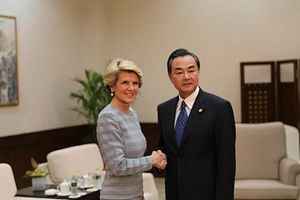Chinese Foreign Minister Wang Yi was in Sydney on Monday for the second annual China-Australia Diplomatic and Strategic Dialogue. The bilateral meeting was co-chaired by Wang and Australian Foreign Minister Julie Bishop. Both Wang and Bishop praised the recent development of China-Australia ties and pledged to seek deeper cooperation on economic and security issues.
It’s been a tense summer for China-Australia relations, thanks to several controversial comments by Australian politicians. In July, Julie Bishop was quoted in Australian media outlets as pledging that the Abbott government would stand up to China. “China doesn’t respect weakness,” Bishop declared, saying that Australia would not be afraid to stand up for liberal and democratic values. Her comments caused a fiery response from Chinese media outlets before Beijing put an end to the fervor by flatly denying that the remarks had ever been made (despite a recording of the on-the-record comments, which were made in an interview with Fairfax Media’s John Garnaut).
Then, in August, Australian businessman and MP Clive Palmer made incendiary remarks about the need to defend Australia against Chinese encroachment. Palmer spoke of “standing up against the Chinese bastards” and listed his reasons for doing so: “because they’re communist, because they shoot their own people, they haven’t got a justice system and they want to take over this country.” A senator from the Palmer-led Palmer United Party, Jacqui Lambie, added her voice to the controversy as well. “If anybody thinks that we should have a national security and defense policy, which ignores the threat of a Chinese Communist invasion — you’re delusional and got rocks in your head,” Lambie said.
Other Australian politicians, including Prime Minister Tony Abbott, denounced Palmer’s remarks. Palmer eventually apologized in a statement. “What I said on Q&A was an insult to Chinese people everywhere and I wish to assure them they have my most genuine and sincere apology,” the statement read. China was happy to accept the apology, which which Xinhua called “a win” for both the Chinese people and for Australians. Xinhua pointed to the outrage over Palmer’s remarks as evidence that China-Australia cooperation cannot be derailed: “When this important relationship was threatened, Australians, just like Chinese, stood up together and without hesitation voiced their strong views.”
The comments by Bishop and Palmer both hint at the central conundrum of the China-Australia relationship: the governments are eager to work together, especially economically, but harbor serious strategic concerns about each other at the same time. For Australia, there are concerns about China’s military build-up and its aggressive actions in its near seas. For some in Canberra, this reinforces a fear that Beijing has no intention of abiding by international laws and standards — something spoken about boldly by Palmer and hinted at demurely by Bishop. Meanwhile, Beijing continues to have concerns about Australia’s role in East Asia, particularly given its alliance with the U.S. and increasingly close ties with Japan. The million-dollar question is whether Australia can avoid having to “choose” between China and fellow U.S. partners in the region. Bishop, in her conversation with Garnaut, was emphatic that Canberra could keep both partnerships, and Beijing believes so as well.
Accordingly, the Diplomatic and Strategic Dialogue sought to emphasize areas of cooperation between China and Australia. Wang Yi, according to Xinhua, called Australia a “key cooperation partner for China in its extended neighborhood,” with a particular focus on Australia’s role as a bridge between “East and West.” Wang added, “China may not be Australia’s closest friend at the moment but China can surely become the most sincere friend of Australia” (an apparent reference to Tony Abbott’s comments last year that Japan was Australia’s “closest friend in Asia.”)
On the economic front, both sides remain committed to finalizing a planned free trade agreement (FTA). The bilateral trade pact has been in the works since 2005 but received a major push from the Abbott government’s emphasis on regional FTAs. Canberra has finalized FTAs with both South Korea and Japan in the last year and looks to add China to that list before the end of 2014. In a statement on the Diplomatic and Strategic Dialogue, Julie Bishop reaffirmed “Australia’s commitment to conclude a Free Trade Agreement by the end of this year.” Ideally, the pact will be concluded in time to be formally unveiled during Xi Jinping’s November visit to Australia for the G20 summit.
When it comes to security issues, Bishop focused outside of the Asia-Pacific region and on the growing crisis in Iraq and Syria. Bishop urged deeper China-Australia cooperation on fighting extremists and jihadists, especially the newly-formed Islamic State (IS). Bishop outlined China and Australia’s shared concerns: “The conflict in Syria and Iraq affects both our nations for foreign fighters are leaving our shores to take part in the brutal and bloody conflict in the Middle East.” Last week, reports emerged that a Chinese national had been captured while fighting for IS. Bishop saw Monday’s talks as an “opportunity to discuss ways that we together can combat terrorism and extremism such as we’ve seen with the emergence of ISIL (the Islamic State of Iraq and the Levant, another name for IS).”
For China, the major strategic concern is far closer to home: the South China Sea. Xinhua reported that Wang Yi had proposed the concept of “Four Respects” for governing the South China Sea issue: respect for historical facts, for international regulations, for direct dialogue between the countries involved, and for “the joint efforts made by China and ASEAN on safeguarding peace and stability of the South China Sea.” The last two of these four principles send a clear message to Canberra: stay out of the disputes.

































